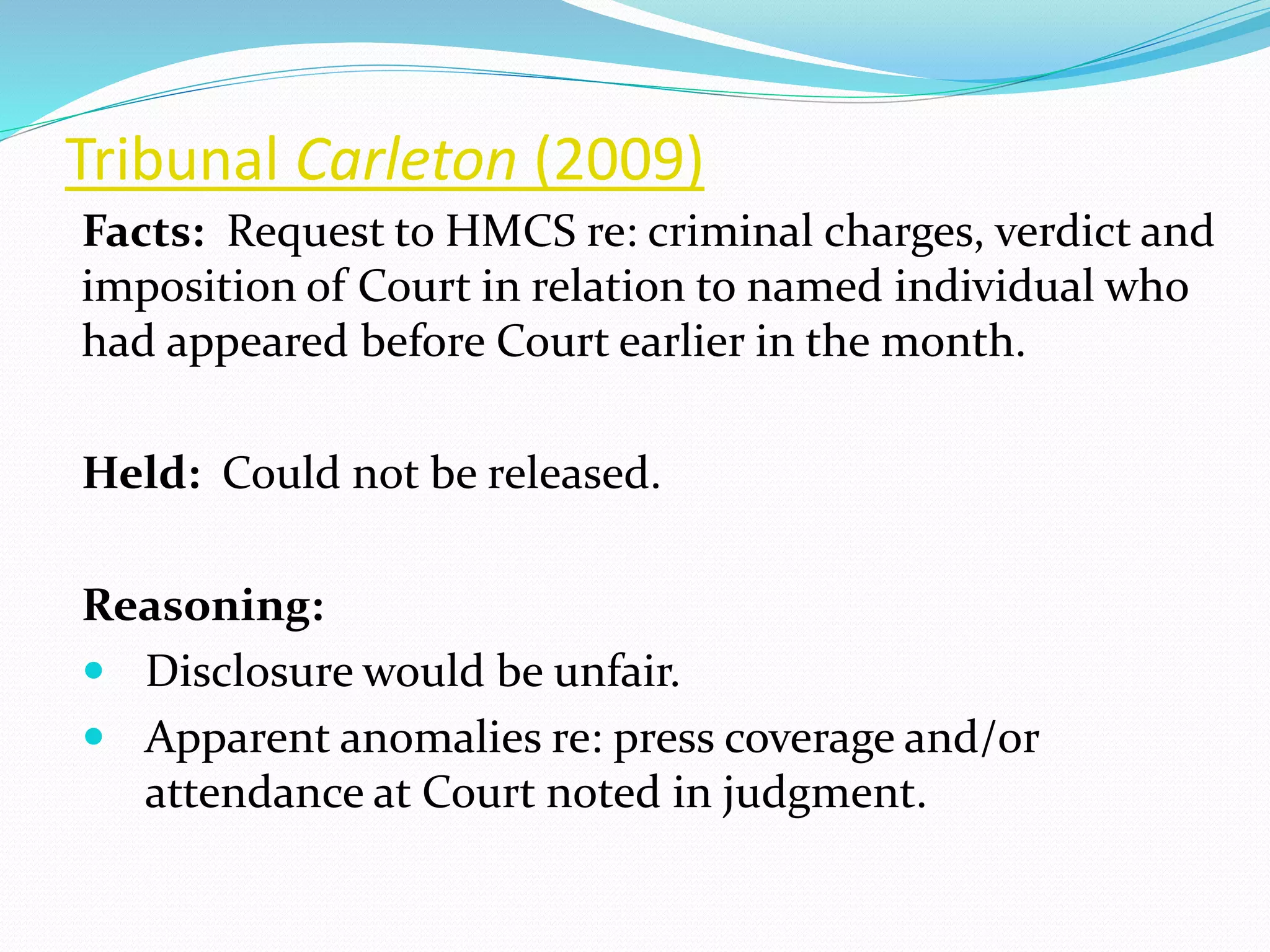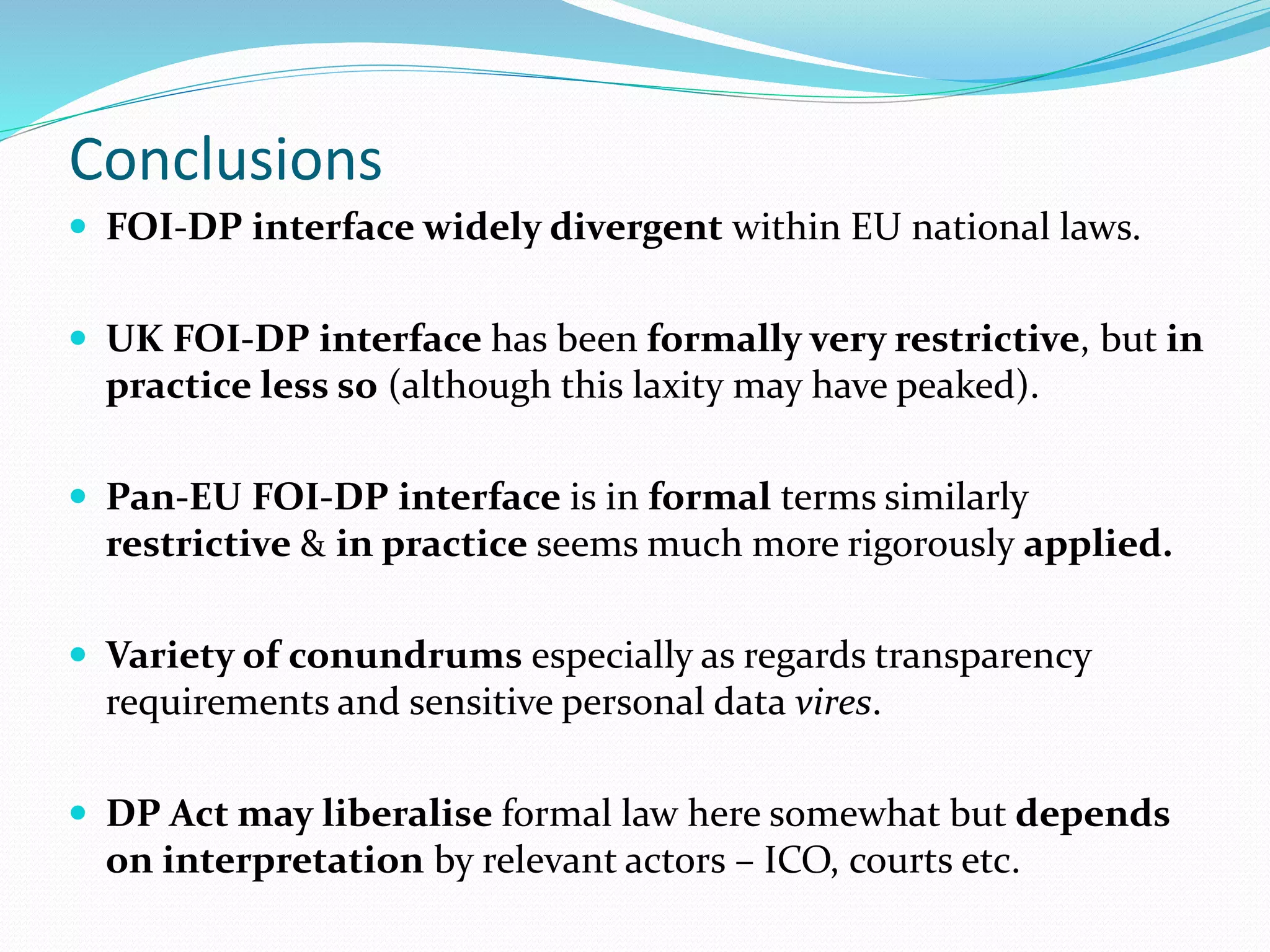The document discusses the legal interface between data protection (DP) and freedom of information (FOI) laws in the EU and UK, highlighting the complexities and differing interpretations across member states. It outlines key aspects of legislation such as the General Data Protection Regulation (GDPR) and the UK Freedom of Information Act, including exemptions and public interest tests related to personal data disclosure. Conclusions indicate that significant divergence in legal approaches is likely to continue, affecting the reconciliation of public access and data protection rights.
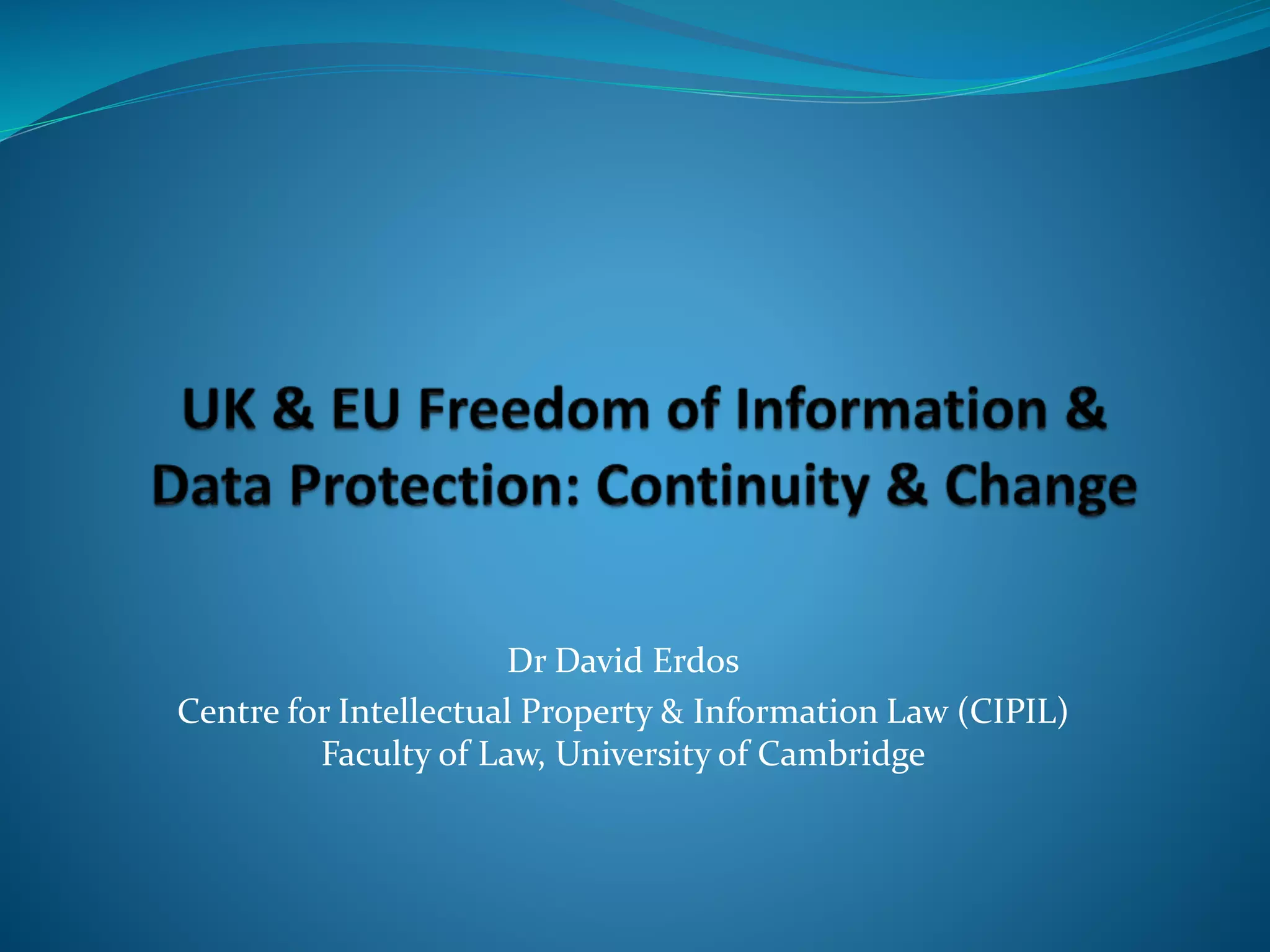
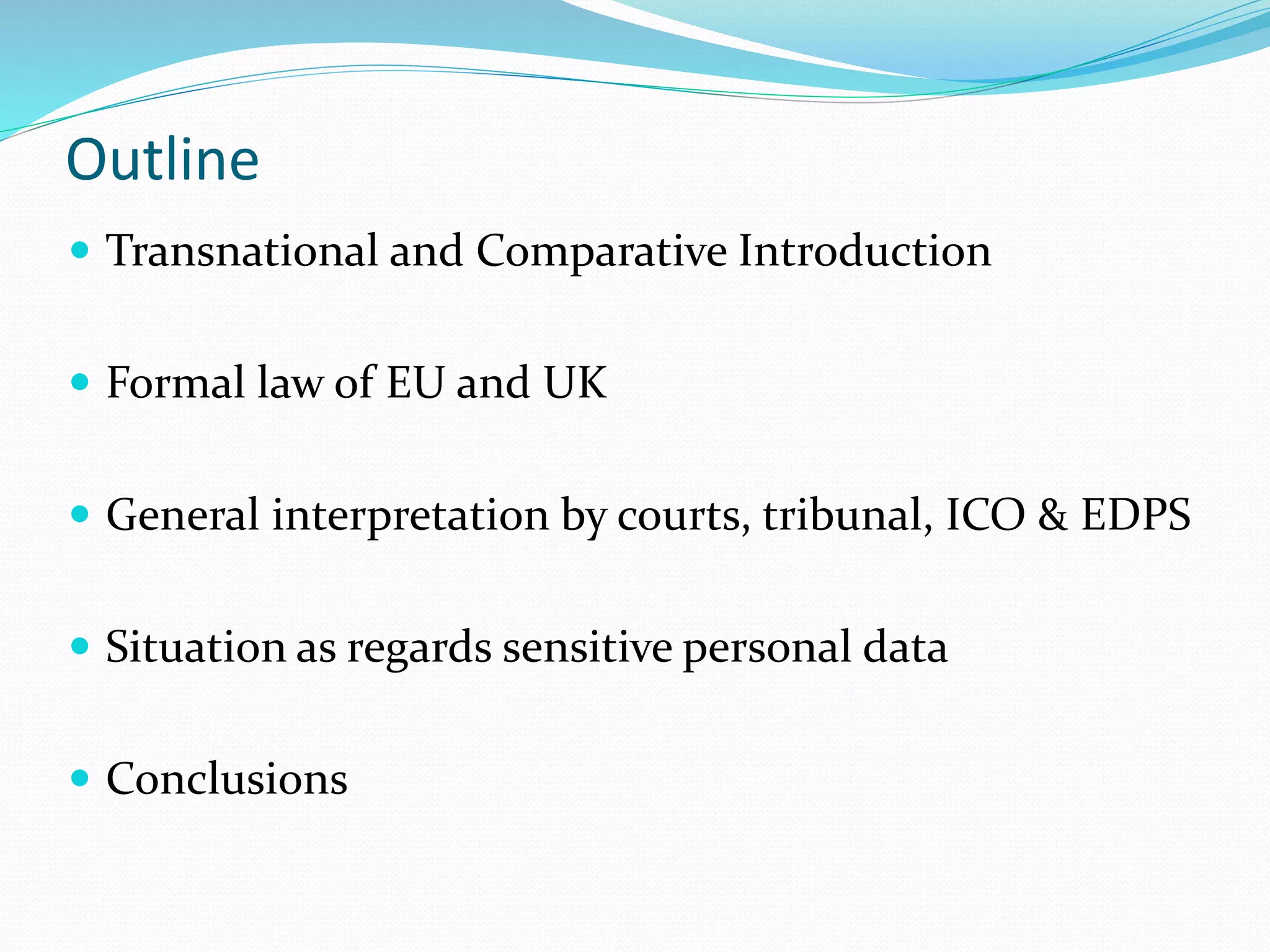
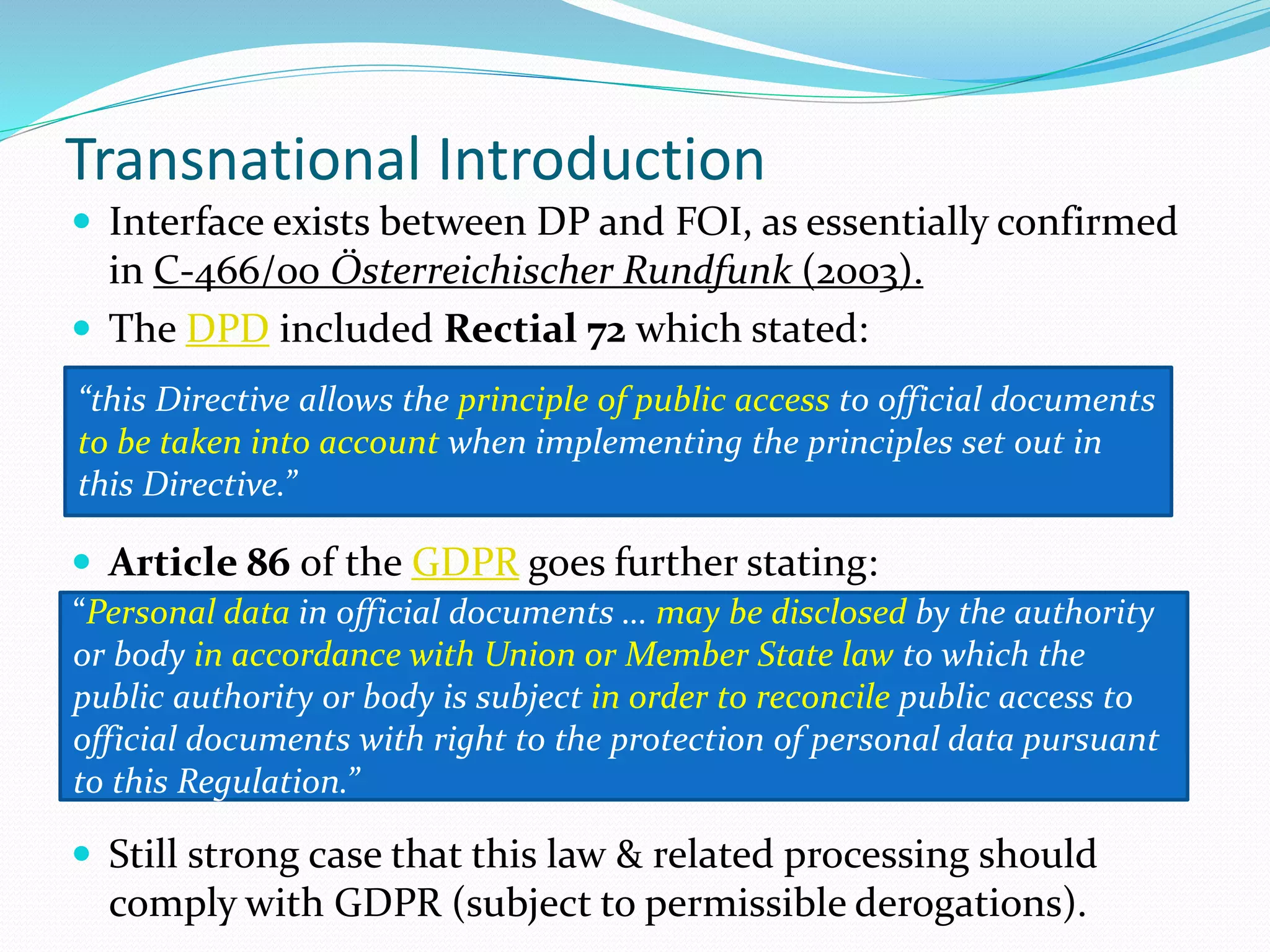
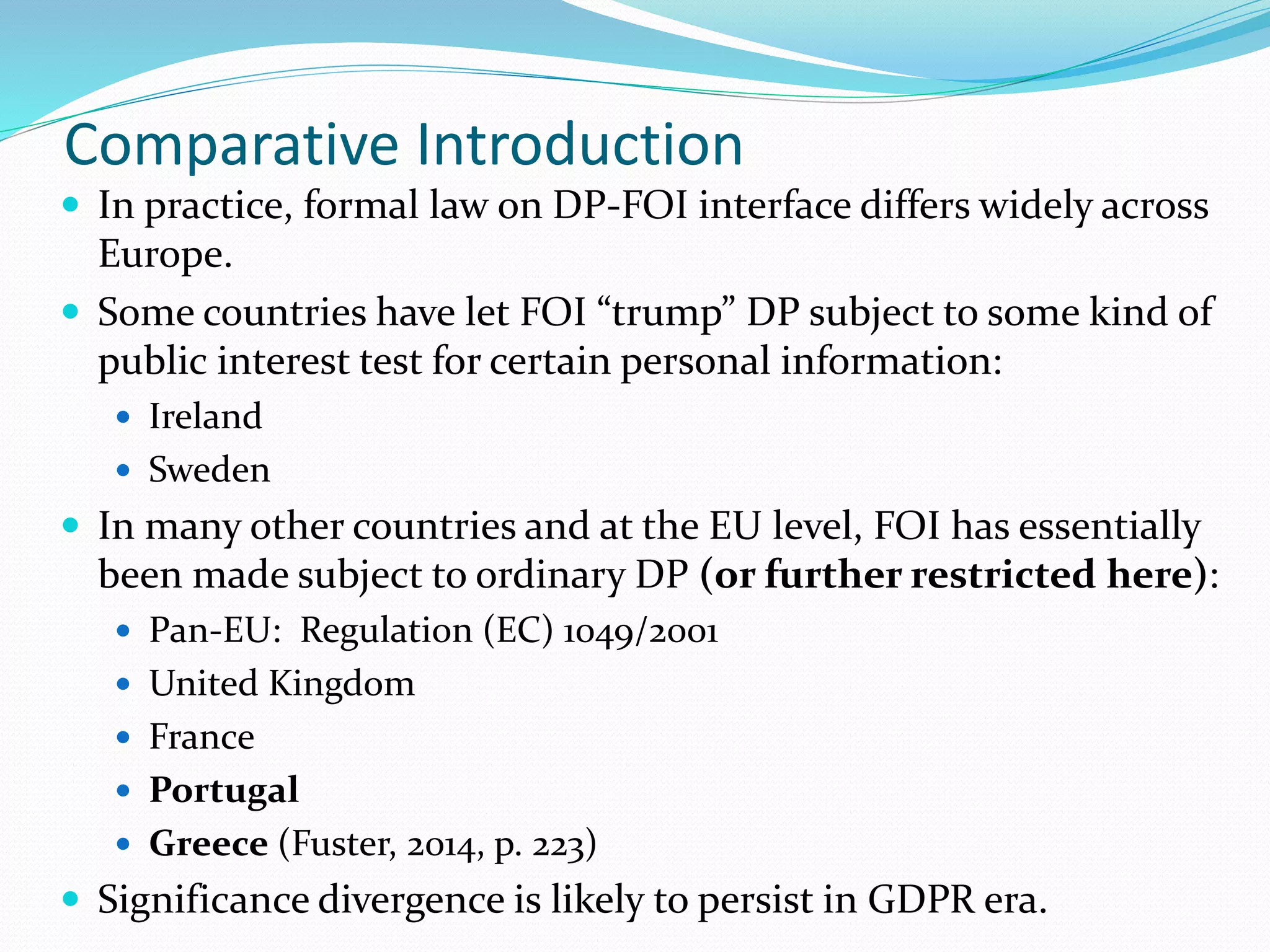
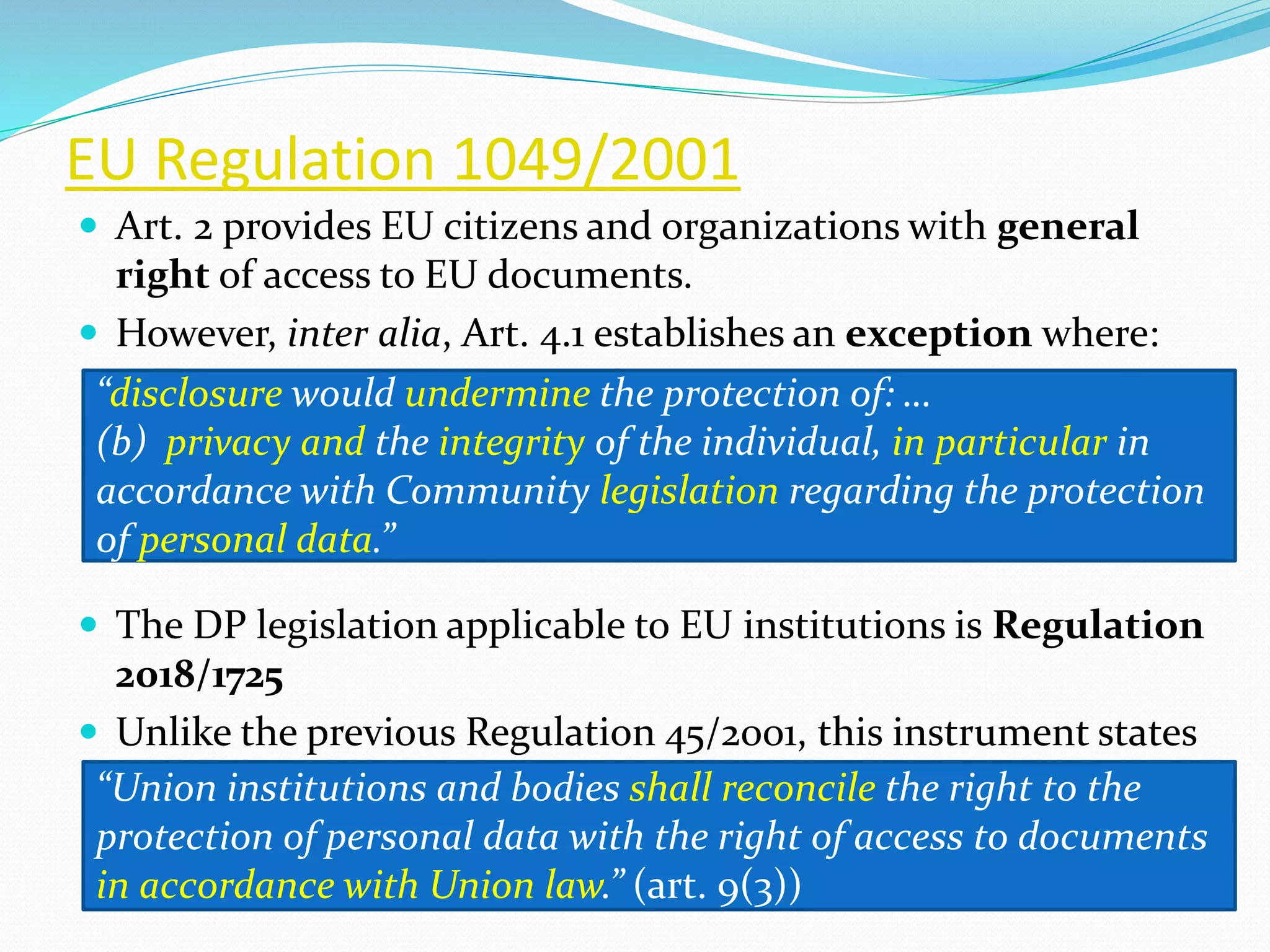
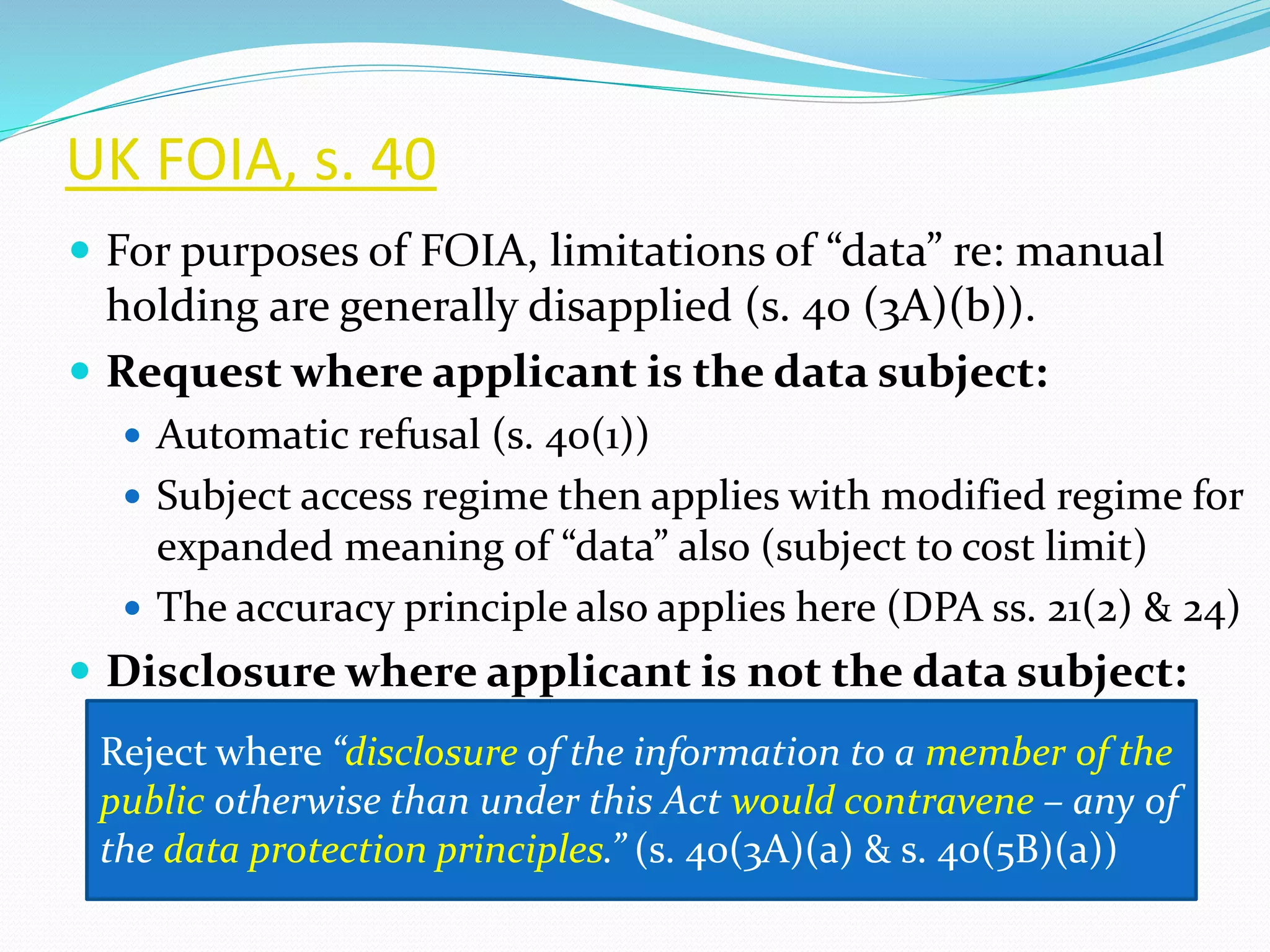
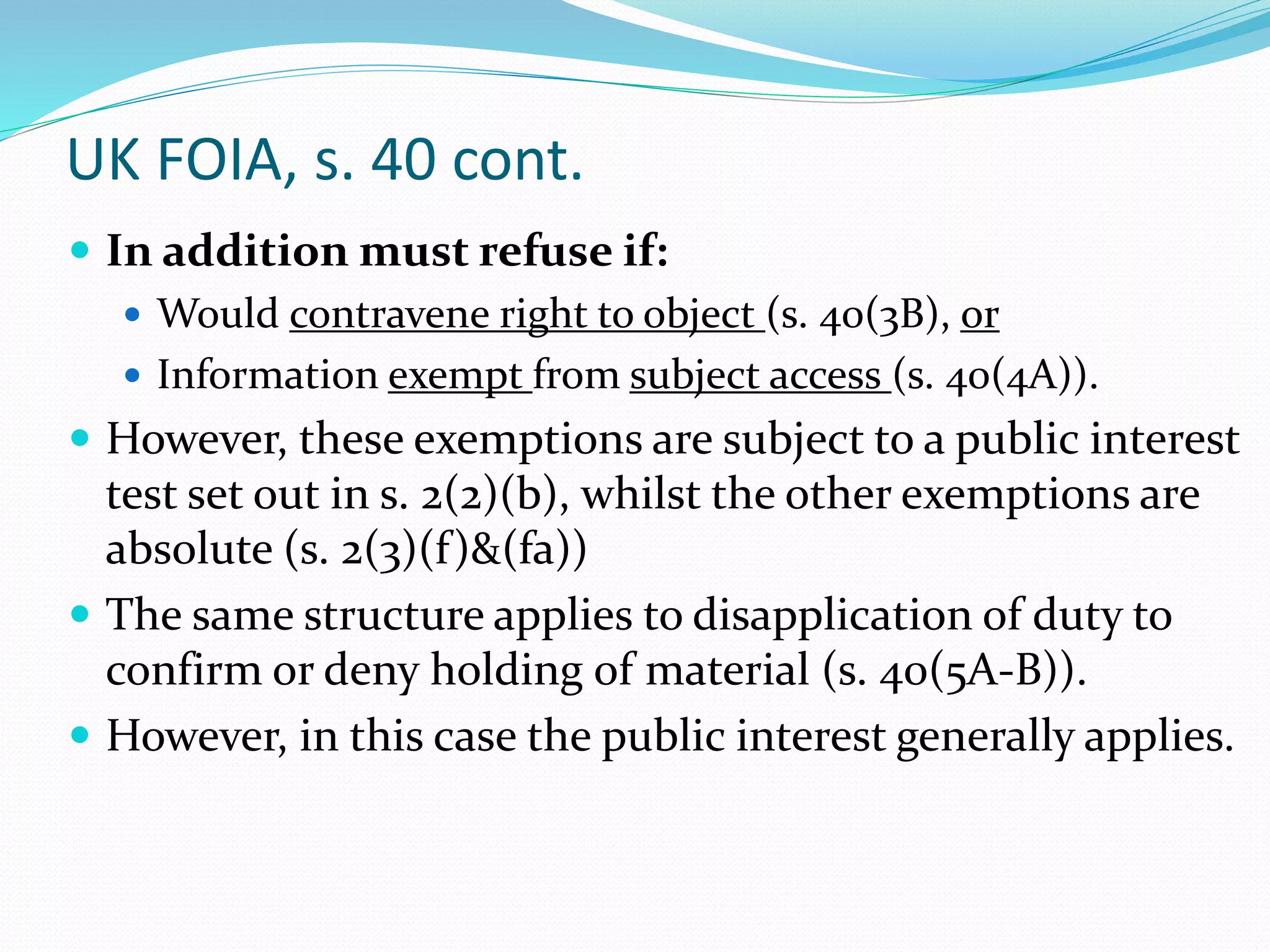
![What are the ʻDP Principlesʼ here?
Under the old DPA 1998, the DP Principles referred to
essentially the entire substantive scheme.
The amended law states that:
What is the status of other parts of GPDR Ch. II (Principles) i.e.
special categories (art. 9) & criminal data (art. 10)?
(7) ….“the data protection principles” means the principles set out in –
(a) Article 5(1) of the GDPR, and
(b) section 34(1) of the Data Protection Act 2018 [re law enforcement]
…
(8) In determining for the purposes of this section whether the lawfulness
principle in Article 5(1)(e) of the GPDR (lawfulness) would be contravened
by the disclosure of information, Article 6(1) of the GDPR (lawfulness) is to
be read as if the second sub-paragraph (disapplying the legitimate interests
gateway in relation to public authorities) were omitted.](https://image.slidesharecdn.com/foiandpersonalinformationfinal-190228103104/75/UK-EU-Freedom-of-Information-Data-Protection-Continuity-Change-8-2048.jpg)
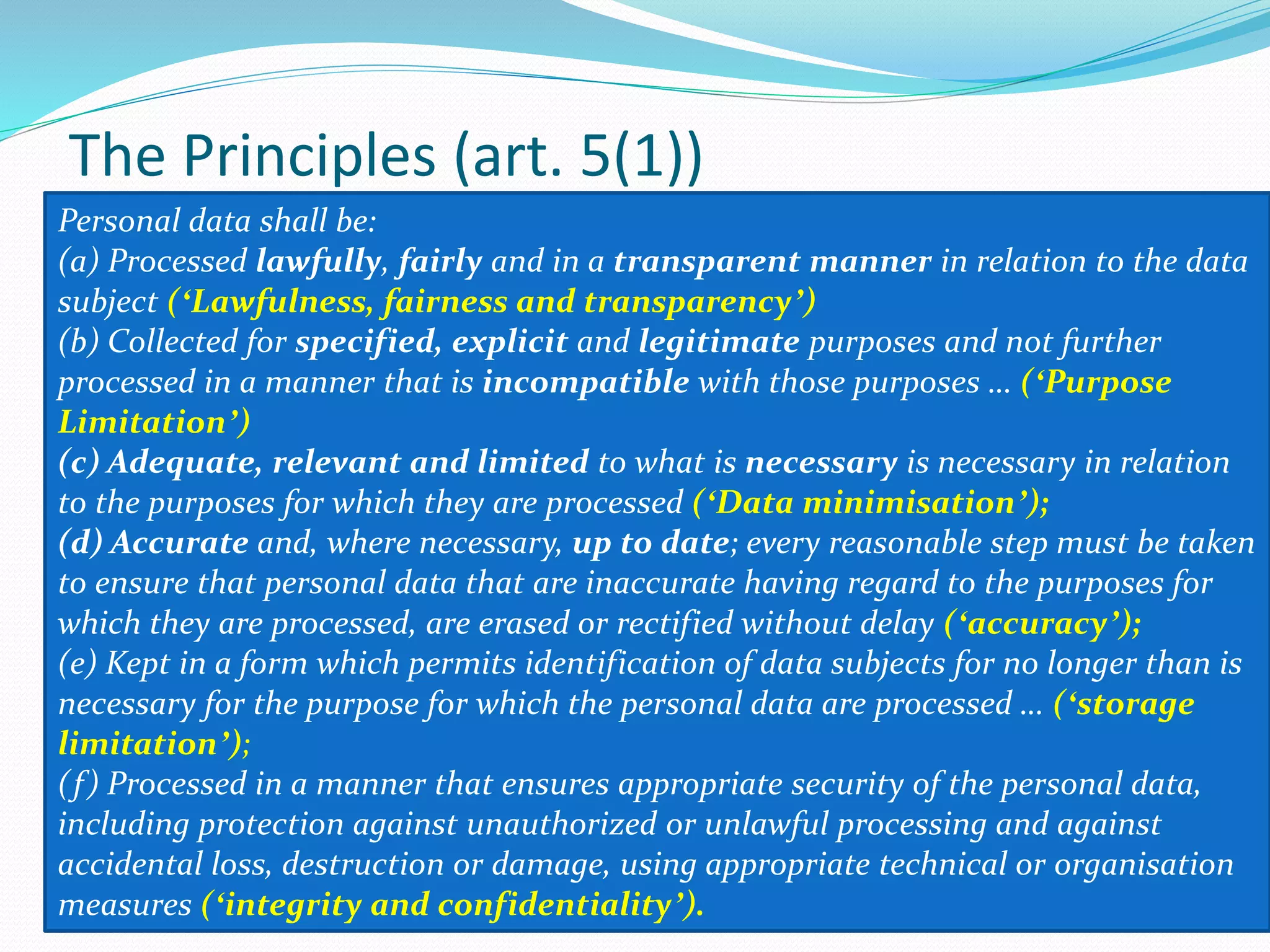
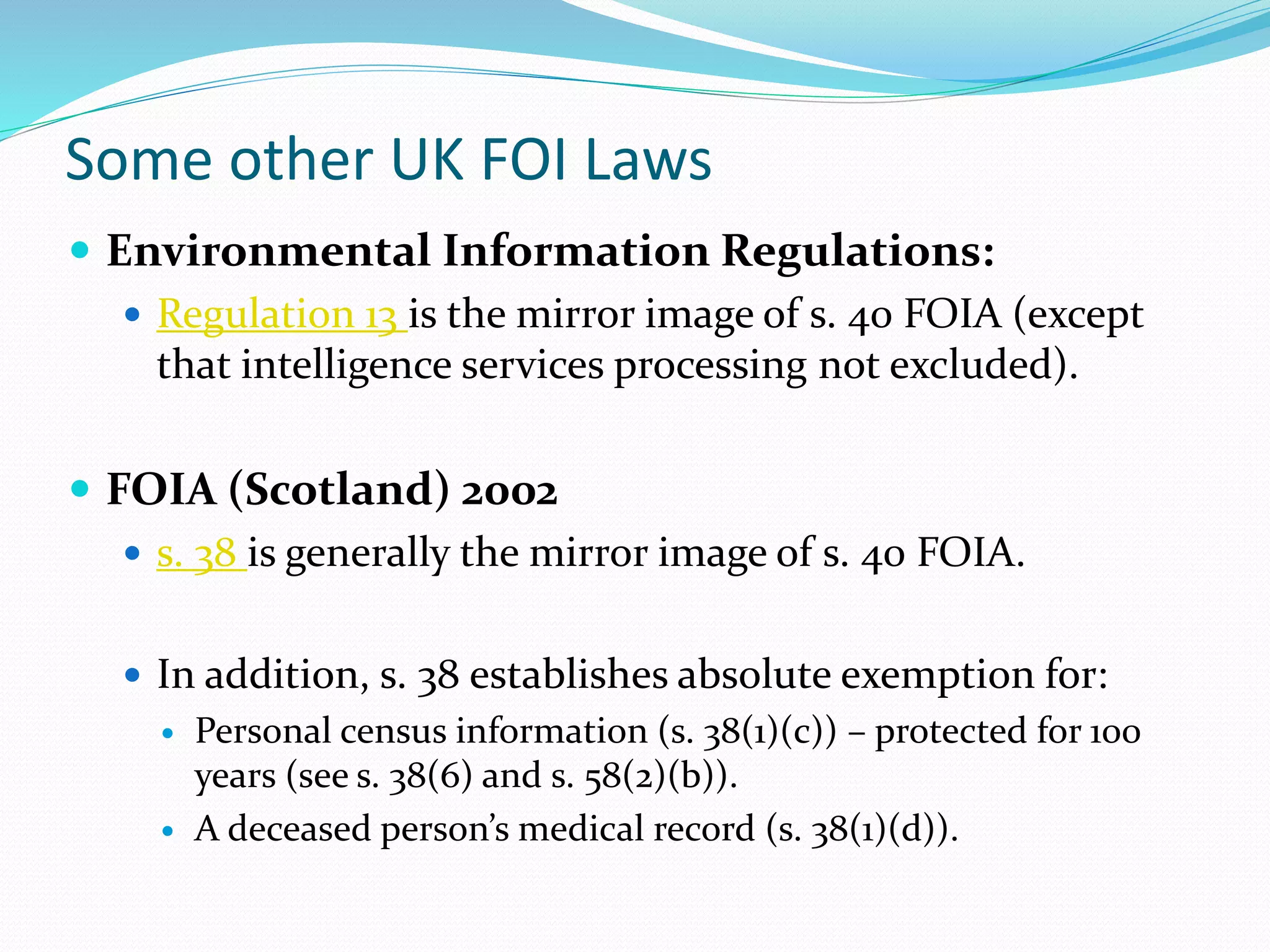
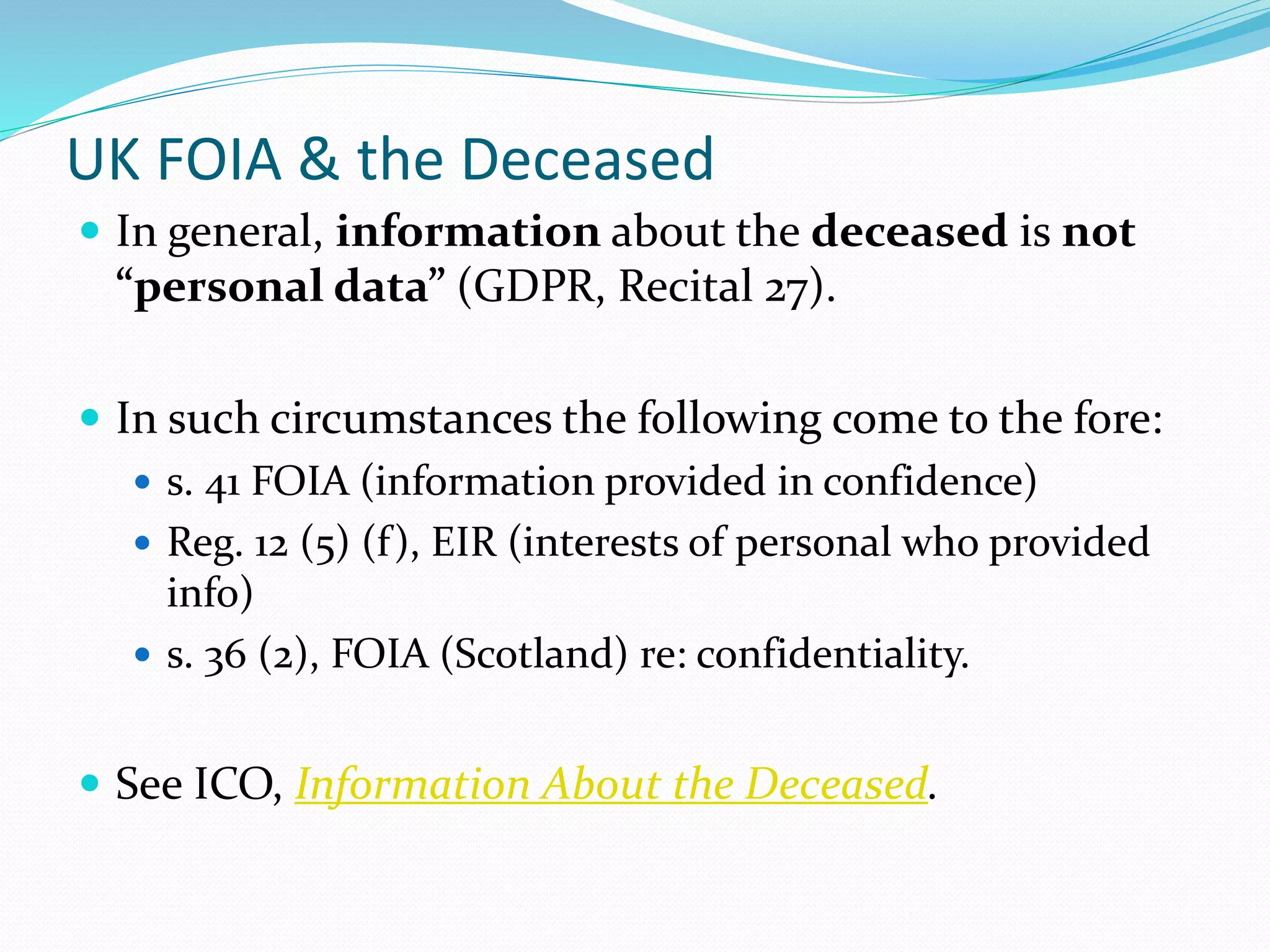
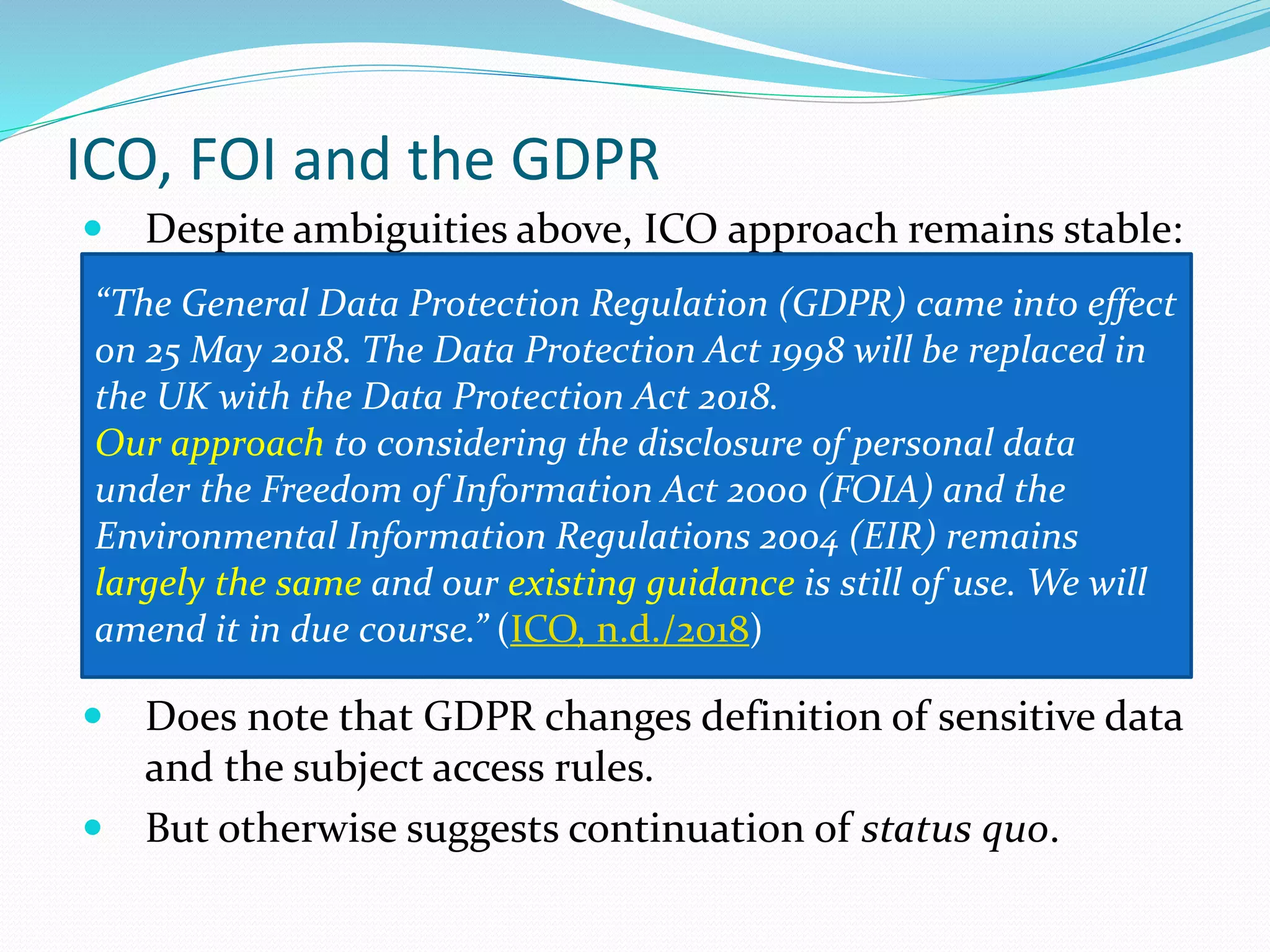
![General Interpretation: ICO Approach (1)
No independent content here to “incompatibility”
“The third, fourth and fifth principles [essentially replicated
in art. 5(1)(c)-(e) of GDPR] are only likely to be relevant to
holding and using data, not to disclosure.”
Similar statement re: security, data transfer etc.
Purposes = authority’s business purposes, so no need to
specify FOIA in notification to data subjects (or
presumably in record keeping).
“There are eight data protection principles [under DPA 1998]. For
the purposes of disclosure under the FOIA, it is only the first
principle – data should be processed fairly and lawfully – that is
likely to be relevant.” (ICO, n.d., p. 10)](https://image.slidesharecdn.com/foiandpersonalinformationfinal-190228103104/75/UK-EU-Freedom-of-Information-Data-Protection-Continuity-Change-13-2048.jpg)
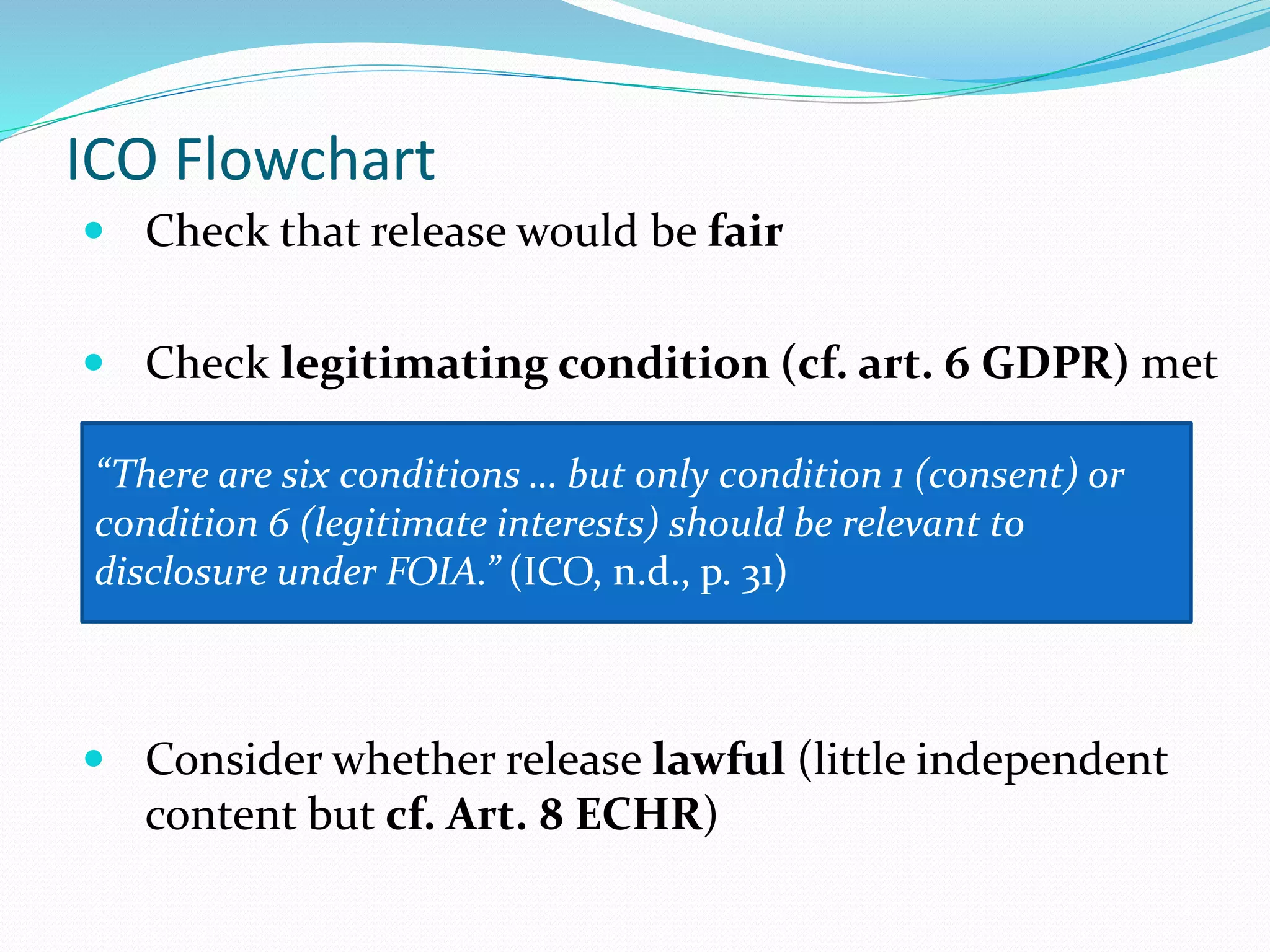
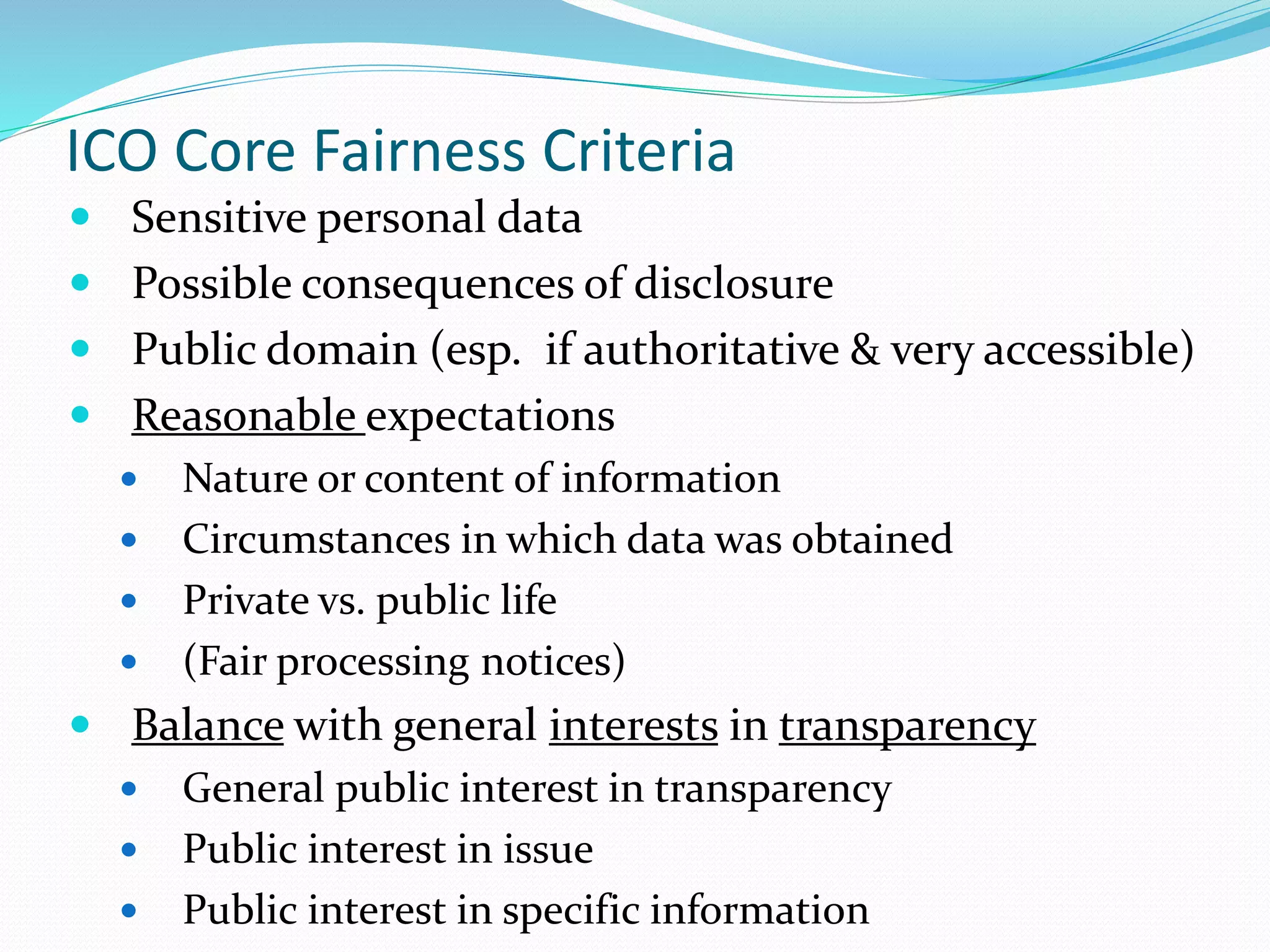
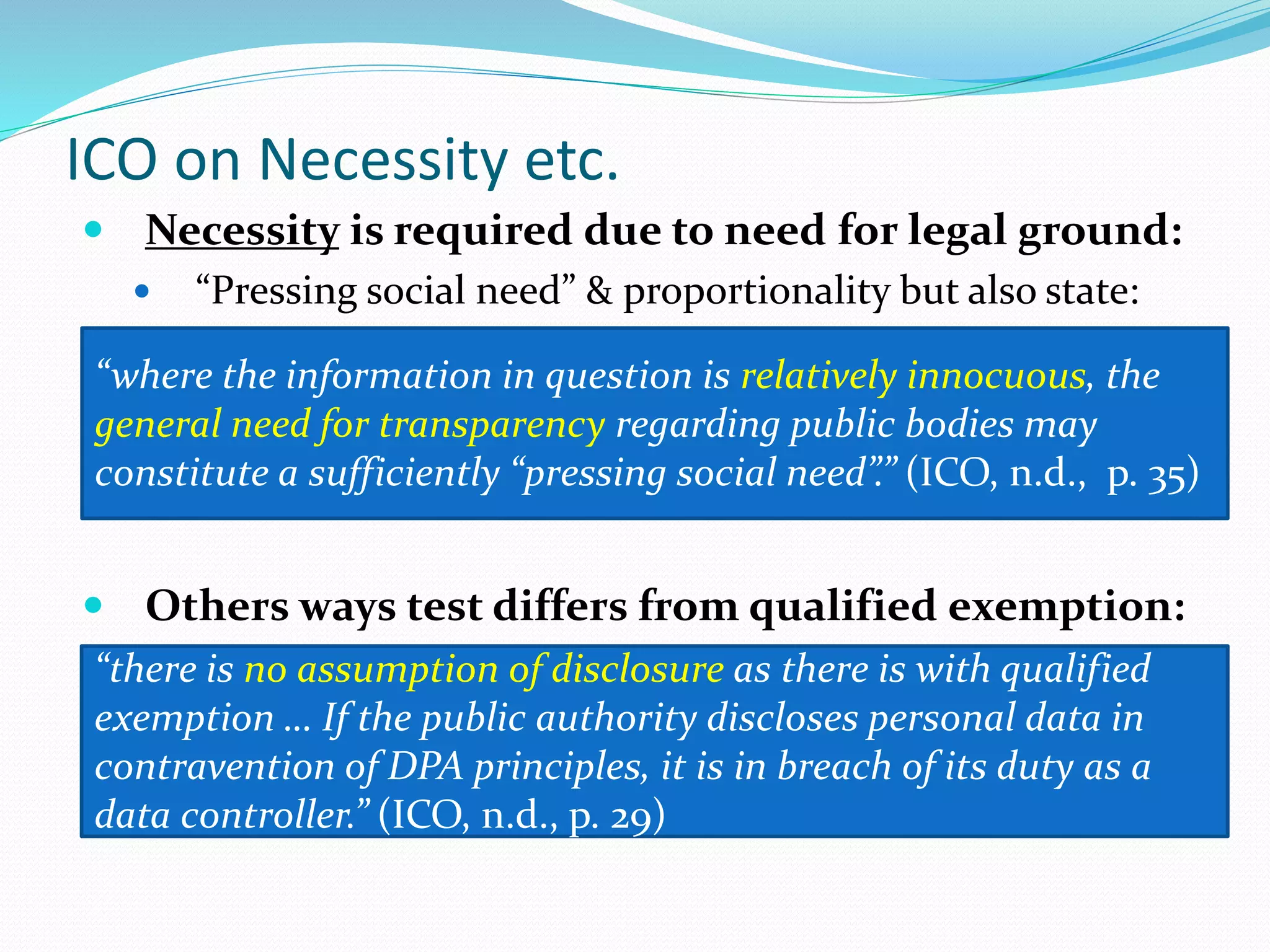
![Stance of Courts: House of Lords (now UKSC)
“there is no presumption in favour of the release of personal data
under the general obligation that FOISA lays down. The
references which that Act makes to provisions of DPA 1998 must
be understood in the light of the legislative purpose of that Act,
which was to implement Council Directive 95/46/EC. The
guiding principle is the protection of the fundamental rights and
freedoms of persons, and in particular their right to privacy with
respect to the processing of personal data: see recital 2 of the
preamble to, and article 1(1) of, the Directive.”
(Lord Hope in Common Services (2008) at [7])](https://image.slidesharecdn.com/foiandpersonalinformationfinal-190228103104/75/UK-EU-Freedom-of-Information-Data-Protection-Continuity-Change-17-2048.jpg)
![High Court: Corporate Officer (2008)
“Pressing social need” not = “indispensable”
“Pressing social need” not = “desirable” or “useful”
“It was common ground that 'necessary' within para 6 of Sch 2
to the DPA should reflect the meaning attributed to it by the
European Court of Human Rights when justifying an
interference with a recognised right, namely that there should
be a pressing social need and that the interference was both
proportionate as to means and fairly balanced as to ends.” (at
[43])](https://image.slidesharecdn.com/foiandpersonalinformationfinal-190228103104/75/UK-EU-Freedom-of-Information-Data-Protection-Continuity-Change-18-2048.jpg)
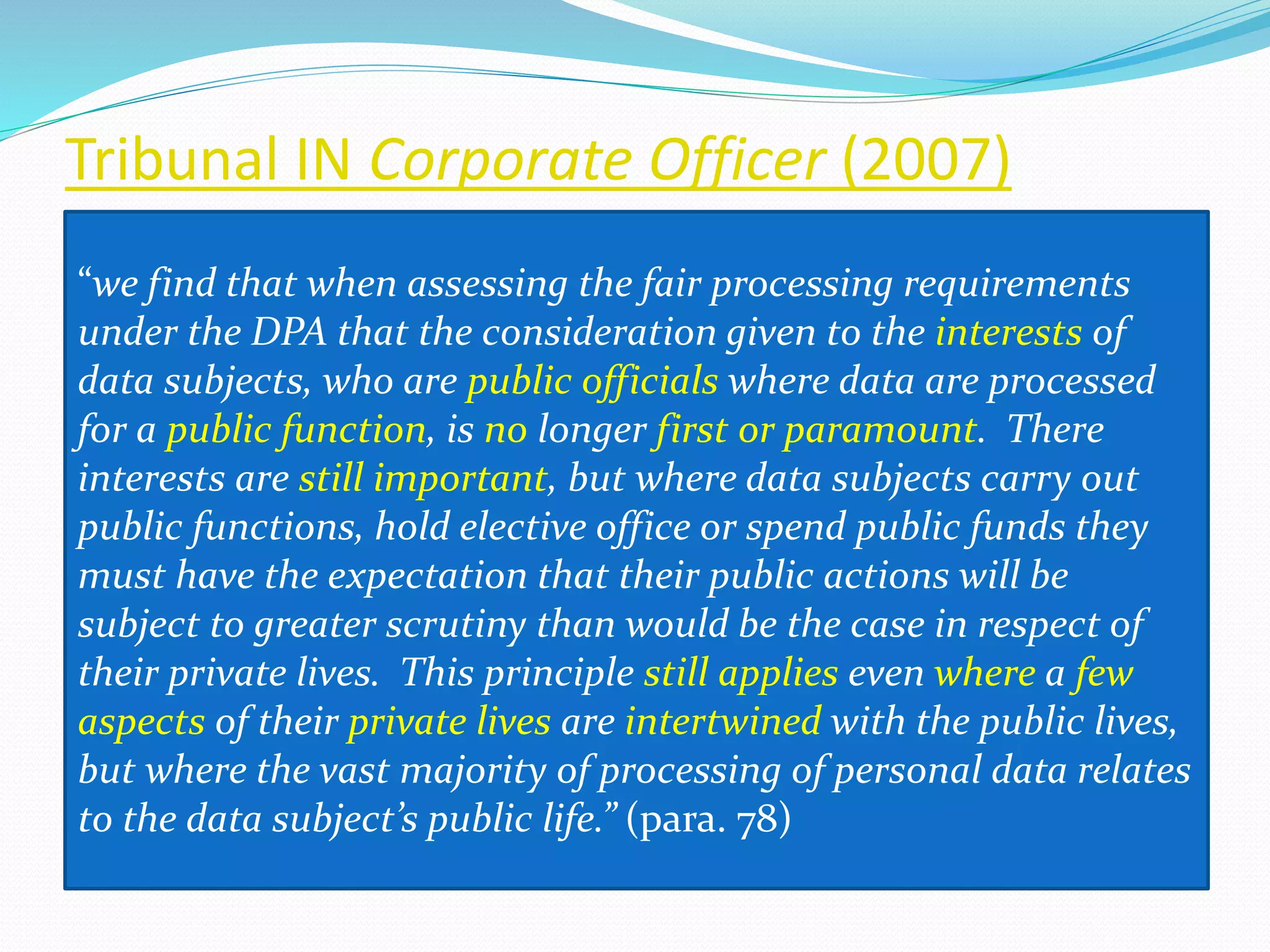
![Tribunal Corporate Officer on Transparency
Note different logic of argument here to ICO guidance
Note criticism of reasoning (“not completely clear”) in
Jay (2012, pp. 263-4)
Issue not directly considered by EWHC in appeal
“we accept … that the requirements of paragraph 2(1) of Part II to
Schedule 1 [the data subject notification provisions] have been
met. We are particularly able to make this finding as the
wording of paragraph 2 (1) (a) only requires that the data
controller “ensures so far as practicable” that data subjects are
provided with the information in sub-paragraph (3), so there is
no absolute requirement.” (para. 75)](https://image.slidesharecdn.com/foiandpersonalinformationfinal-190228103104/75/UK-EU-Freedom-of-Information-Data-Protection-Continuity-Change-20-2048.jpg)
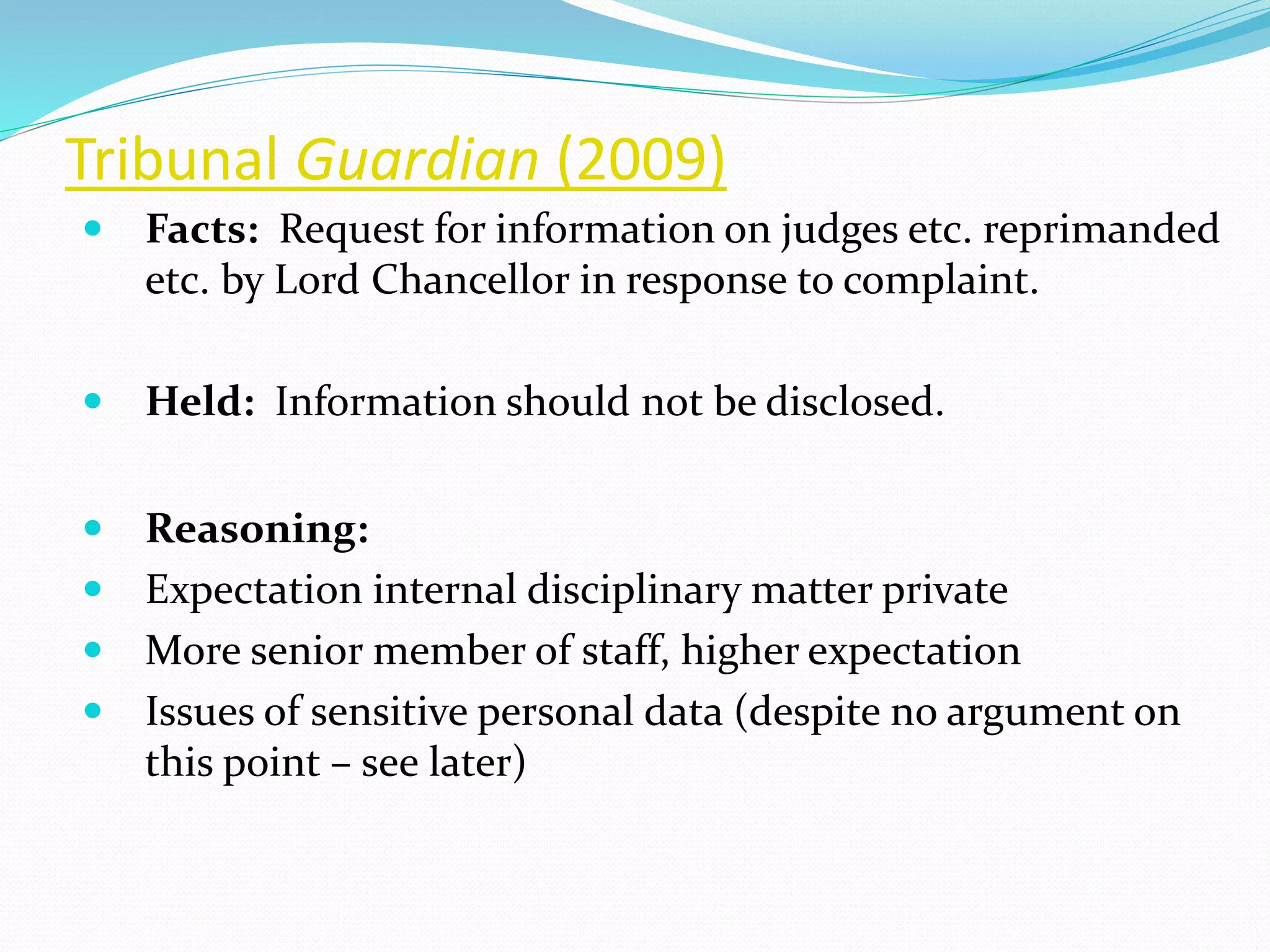
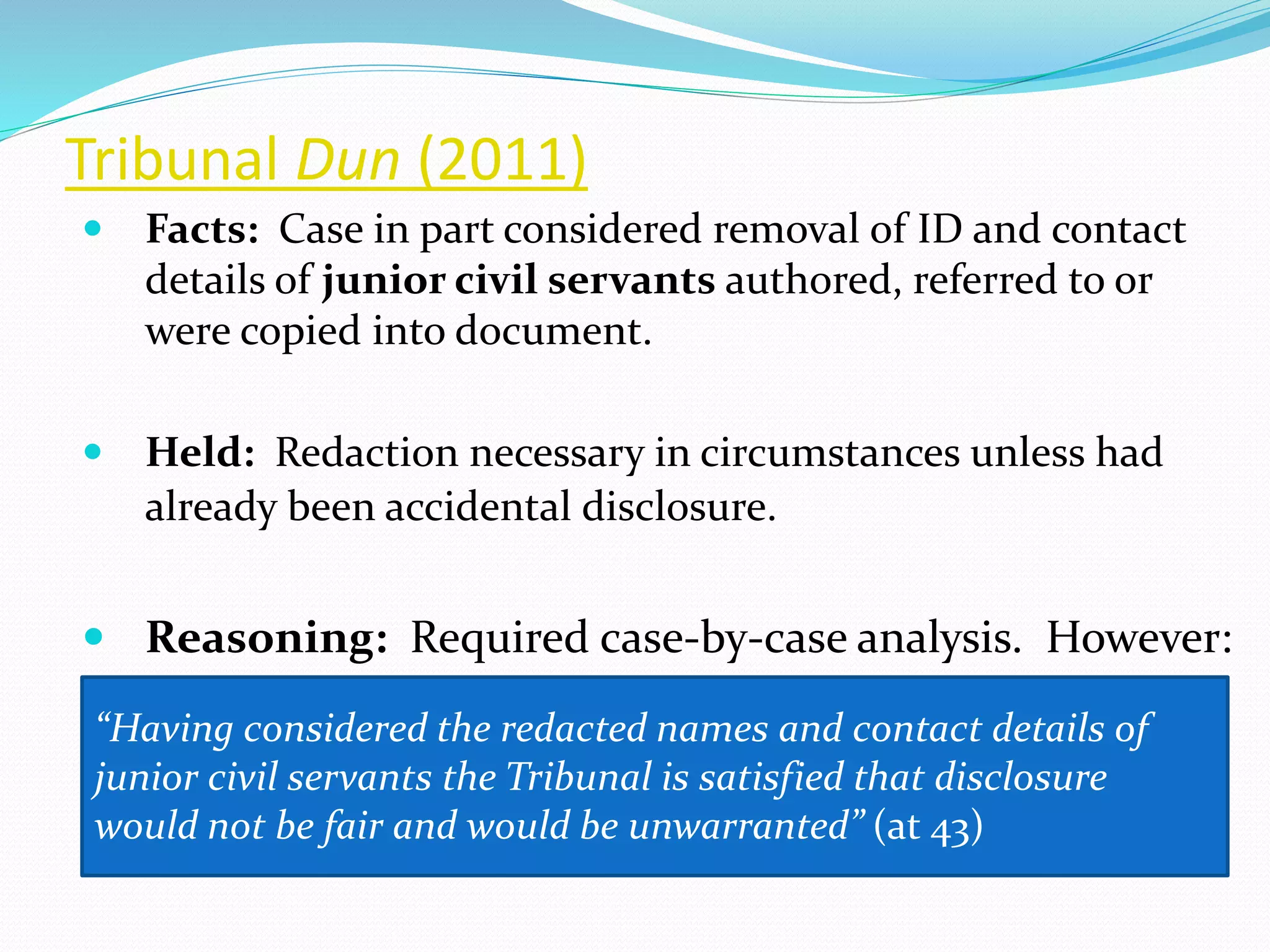
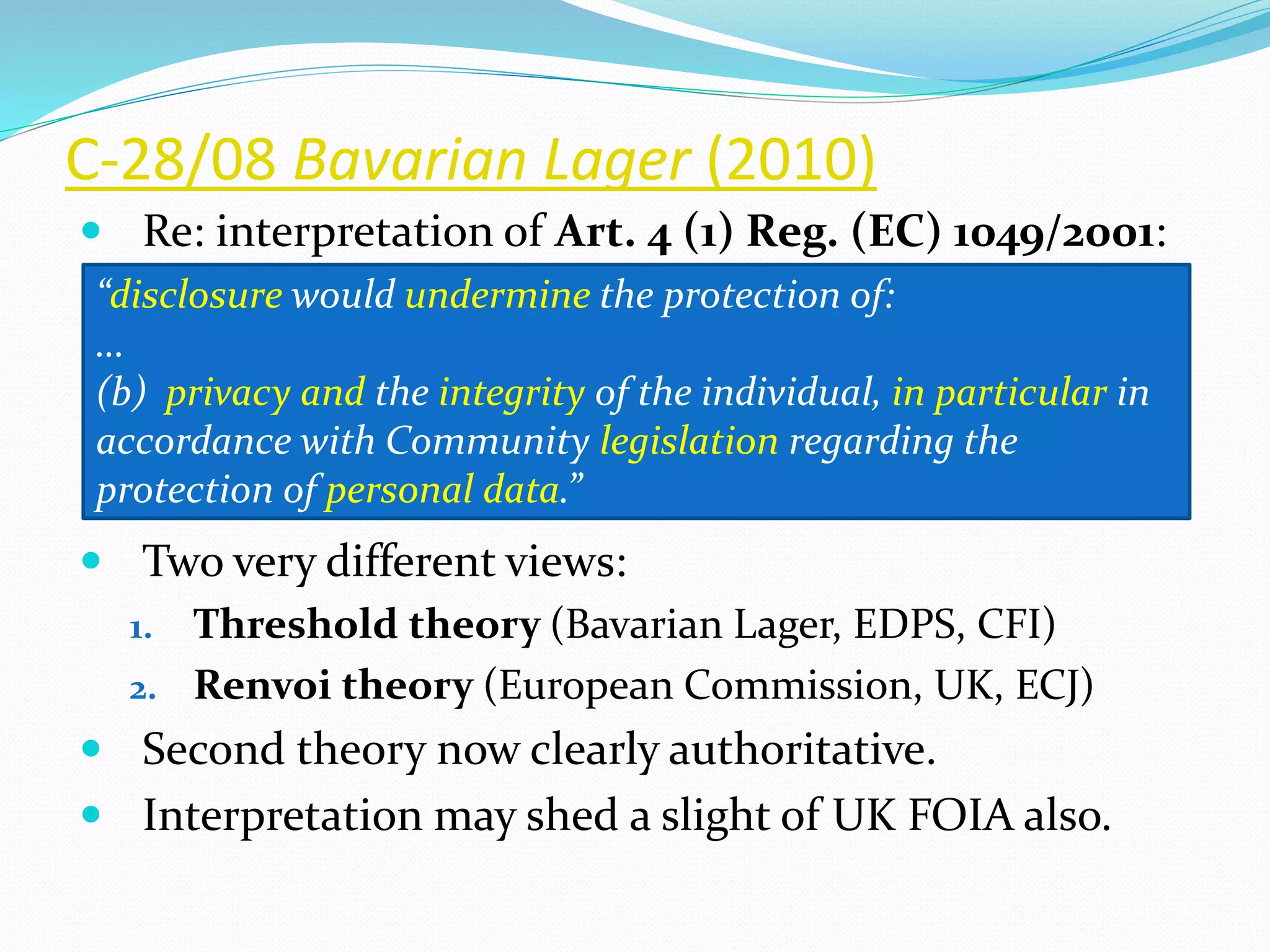
![C-28/08 Bavarian Lager (2010)
Facts: Bavarian Lager internal market violation claim.
Infringement proceedings opened. Meeting. Proceedings
dropped. Request names of people at meeting. Rejected
where no consent (in 2 cases) or unable to contact (in 3).
Held: Commission right to refuse disclosure in all 5 cases.
Reasoning:
“[W]here a request based on Regulation No. 1049/2001 seeks to
obtain access to documents including personal data, the
provisions of Regulation No 45/2001 became applicable in their
entirety, including Articles 8 and 18 thereof.” (at [63])](https://image.slidesharecdn.com/foiandpersonalinformationfinal-190228103104/75/UK-EU-Freedom-of-Information-Data-Protection-Continuity-Change-24-2048.jpg)
![A. 8 (same thrust in art. 9(1)(b) of new Reg)
“personal data shall only be transferred to recipients subject to the
national law adopted for the implementation of Directive 95/46/EC,
… (b) if the recipient establishes the necessity of having the data
transferred and if there is no reason to assume that the data
subject's legitimate interests might be prejudiced.” (Reg. 45/2001)
“As Bavarian Lager had not provided any express and legitimate
justification or any convincing argument in order to demonstrate
the necessity for those personal data to be transferred, the
Commission has not been able to weigh up the various interests of
the parties concerned. Nor was it able to verify whether there was
any reason to assume that data subjects’ legitimate interests might
be prejudiced, as required by Article 8 (b) of Regulation No.
45/2001.” (at [77])](https://image.slidesharecdn.com/foiandpersonalinformationfinal-190228103104/75/UK-EU-Freedom-of-Information-Data-Protection-Continuity-Change-25-2048.jpg)
![Reg. 45/2001, art. 18 (cf. arts. 14-16 of new Reg)
“The data subject’s right to object
The data subject shall have the right:
…
(b) to be informed before personal data are disclosed for the first
time to third parties or before their and used on their behalf for the
purposes of direct marketing, and to be expressly offered the right
to object free of charge to such disclosure of use.”
A. 14-16 of new Reg. mirrors information notice req. in GDPR:
Originally direct collection: New notice if new purpose.
Other personal data: Also new notice unless e.g.
“disproportionate basis” but then safeguards including
“making the [transparency] information publicly available”.](https://image.slidesharecdn.com/foiandpersonalinformationfinal-190228103104/75/UK-EU-Freedom-of-Information-Data-Protection-Continuity-Change-26-2048.jpg)
![EDPS on Transparency (2011)
“The institution involved, as controller of the data, is under an
obligation to inform the data subject at the moment of collection of
the data about, inter alia, the purpose of the processing operation for
which the data are intended and the recipients or categories of
recipients of the data (see Articles 11 and 12 of the [old] data
protection regulation [45/2001]) ….
In situations in which the public disclosure is not unconditionally
announced at the moment of the data collection, the EDPS considers
it an element of fair processing (Article 4(1)(a) of the [2001] data
protection regulation [45/2001]) that the data subject is informed
subsequently before the information is in fact disclosed to the public.
Informing the data subject about the envisaged disclosure enables
data subjects to invoke their rights under the data protection
regulation.” (p. 9)](https://image.slidesharecdn.com/foiandpersonalinformationfinal-190228103104/75/UK-EU-Freedom-of-Information-Data-Protection-Continuity-Change-27-2048.jpg)
![Sensitive Data: ICO Approach
Under DPA 1998 took strict view re: special vires:
Argued best to consider special vires before general vires.
ICO has maintained this strict approach under DPA 2018:
“The only [special] conditions … that are relevant to disclosures
under FOIA are condition 1 (explicit consent) or condition 5
(information already made public by the individual). This is
because the other conditions concern disclosure for a stated
purpose, and so cannot be relevant to the ‘applicant-blind’ and
‘purpose-blind’ nature of disclosure under FOIA.“ (p. 30)
“[P]ublic authorities should consider whether disclosure would
breach the data protection principles. (In the case of special
category or criminal offence data, public authorities must also
satisfy one of the conditions listed in Article 9 of the GDPR).”](https://image.slidesharecdn.com/foiandpersonalinformationfinal-190228103104/75/UK-EU-Freedom-of-Information-Data-Protection-Continuity-Change-28-2048.jpg)
